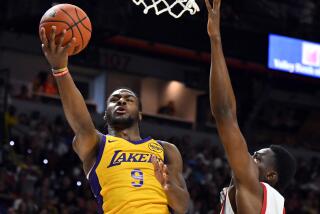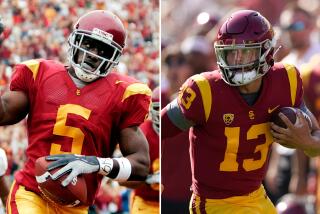It’s All a Big Numbers Game for These Players
The $38,000 that Clinton Portis coughed up to wrest jersey No. 26 from one-time Washington Redskin teammate Ifeanyi Ohalete may have set records in terms of cost and aggravation.
The previous high, after all, was believed to be the $25,000 Rickey Henderson paid to get No. 24 from Turner Ward in Toronto, followed by the $15,000 Rolex that Roger Clemens handed over to Blue Jay first baseman Carlos Delgado for No. 21.
But real connoisseurs of jersey-swapping know the Portis deal is only the second-worst ever made.
Topping that list is former reliever Mitch “Wild Thing” Williams, who upon being traded to the Phillies in 1991, bought No. 28 from John Kruk for two cases of beer.
“I knew it would be beer or Ding Dongs,” Williams said. “I just didn’t know which.”
What Kruk didn’t know at the time was how much bargaining power he had. Williams’ wife already owned some very expensive jewelry with “28” as the centerpiece, souvenirs from her husband’s last stop in Chicago. Even so, Kruk recalled a few years later, he got the better of the deal.
“The best part about it,” Kruk said, “is that Mitch got divorced, he wears No. 99 and the two cases of beer are gone.”
New York Giant punter Jeff Feagles fared even better. Twice.
Last year, he sold No. 10 to rookie Eli Manning in exchange for an all-expenses-paid vacation on the Gulf of Mexico.
“The whole family is flying in, we rented a car, rented a house for a week and we’ll be relaxing on the beach,” Feagles said. “And we’re all going to be wearing No. 10 jerseys. I’m actually going to get Eli’s address and send him a postcard from there.”
But his good-luck tale doesn’t stop there.
After fleecing Manning, Feagles switched to No. 17 to commemorate his 17th professional season. But this year the Giants signed free agent Plaxico Burress on March 17 -- and the former Pittsburgh receiver had to have the number. Turned out Feagles was happy to commemorate his 18th season -- for the right price.
“I bought a new house in Arizona and I’m redoing it. So there you have it,” he said. “This year it’s for an outdoor kitchen.”
If you’re looking for a rational explanation, good luck. Considering the recent spike in prices, even superstition doesn’t quite explain the practice. But some ballplayers clearly obsess over numbers more than they should.
Former Red Sox pitcher Bill “Spaceman” Lee was convinced No. 8 played an integral part in Boston slugger Carl Yastrzemski’s string of accomplishments.
“When laid on its side,” Lee noted, “the number ‘8’ resembles the symbol for infinity. That symbol was recharging Yaz’s batteries.”
Eddie Gaedel, the 3-foot-11 midget hired by mischievous owner Bill Veeck, wore “1/8” in his only major league at-bat (walking on four pitches). Japanese ballplayers won’t wear No. 4, because the word for it, pronounced “shi,” also means death. Minor-leaguer John Neves had “7” stitched on his jersey facing backward, because his name was the number spelled the same way.
Unfortunately, not everybody has options. NBA star Rick Barry took to wearing “2” at home and “4” on the road because he couldn’t get No. 24 after winding up at Houston. When Carlton Fisk moved from Boston to Chicago and couldn’t talk Ken Kravec out of his old No. 27, he simply donned “72” to mark “a turnaround in my career.”
The resistance those two encountered was nothing compared to what Frank Viola heard when he tried to buy No. 16 from Dwight Gooden after joining the Mets in 1989.
“He can have my locker. I’ll take him to all the best restaurants and show him New York. He can even have my wife,” Gooden said. “But he can’t have my number.”
Had Ohalete liked No. 26 more and “$$$” less, Portis would have saved himself a nice piece of change. But Portis was so determined to get the number after moving from Denver to Washington last year that he drew up a contract with Ohalete and had equipment manager Brad Berlin witness it.
Portis paid $20,000 up front and promised another $10,000 by Week 8, and $10,000 more by Christmas. Then Ohalete was cut by the Redskins during training camp in August and claimed off waivers by Arizona.
Portis figured he was home free -- until he was served with a lawsuit.
“I think he’s crazy,” Portis said last December, “so I guess we’ll be in court together.”
That could have taken place Tuesday in a Maryland District Court. But the two sides settled for a lump-sum payment of $18,000.
“I don’t think we were friends before and I don’t think we’ll be friends now,” Ohalete said. “It was all business.”
Portis was unavailable for comment, but this much is clear: He didn’t do his homework.
In 1969, a running back from USC named O.J. Simpson was the top pick of the Buffalo Bills, and when he arrived in training camp, a second-year back named Gary McDermodt already owned Simpson’s favorite No. 32.
Instead of reaching into his pocket, Simpson played so ferociously in training camp that McDermodt was cut long before the season-opening kickoff.
More to Read
Go beyond the scoreboard
Get the latest on L.A.'s teams in the daily Sports Report newsletter.
You may occasionally receive promotional content from the Los Angeles Times.










